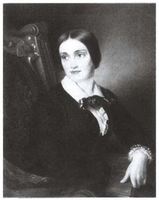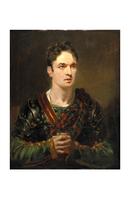"Theatres, etc.", Era, Oct 10, 1847
Dublin Core
Title
Subject
Description
Credit
The British Library Newspapers, Gale Digital Collections
Source
Publisher
Date
Type
Article Item Type Metadata
Text
THEATRES, ETC.
[…]
PRINCESS'S. — The Princess's Theatre threw open its doors on Monday last, for the first night of the season. The great attraction was the seeing, face to face, Mr. Macready and Miss Cushman, who are said to resemble one another so closely, that many mistake one for the other, and several sceptics at one time insisted upon it that Miss Cushman was Mr. Macready in disguise, and vice versa. Nobody could, or can fail to see the similarity that exists between these justly celebrated performers —resemblance of voice, style, feature, and action, the fact of which, we hear, was communicated to the talented actress in her own country, America, before she had seen our first tragedian, and by no other than her own mother, who had been particularly struck with it. We are bound in gallantry to observe that the lady is decidedly the better looking of the two. The absence, however, of conspicuous claims to beauty on the part of Miss Cushman, is soon forgotten if ever noticed, and her triumph over such personal disadvantages heighten her in the estimation of those who can properly appreciate far more desirable qualities than regular features and an approved figure and even an agreeable voice.
The play selected for the opening was "Macbeth." Mr. Macready's Macbeth is familiar to everybody. It is a finished piece of acting, spirited, and full of excellence if not faultless. He has studied the part deeply and long, and setting aside his peculiarities, nothing could be better rendered. Miss Cushman's Lady Macbeth is very fine. It is the performance of no common mind, the delineation of one who thoroughly understands what the author meant, and possesses the power of expressing it in a manner which mere words cannot convey. It lacked grace, we might almost say, dignity and the angular attitudes, the sharp an upward jerking of the bent arms were not in keeping with our ideas of queenly attributes, and what we read of Siddons, acknowledged to have been more majestic than Majesty itself; but there was in Miss Cushman evidence of great resolves, of pride and passion, and her delivery of the most difficult passages — language which represented thoughts that cannot be adequately expressed — was true to nature, and fully effective withal. The storm of her bosom was seen to rage, the whirlwind of her conflicting feelings was expressed and felt. In the sleep-walking scene she was extraordinarily impressive. In her first costume we could have wished that she had dispensed with the lappels of the head-dress that meet at the chin. However "correct" such gear might be deemed, it did not become Miss Cushman's face; on the contrary, it made her features resemble that of a very old woman, and set off her profile to still greater disadvantage, as fact applauding audience divested of the disfiguring contrivance to which we allude.
The resemblance between the two performers, although still strong, is not so great when they are together. It was thought that Mr. Macready would never consent to the test thus afforded, but Mr. Maddox is persuasive. The curiosity of the public, it was thought, added to the individual strength of the actor and actress, would make a great "draw;" the house, however, was full, but not "crowded to suffocation." There was room for more, but London is not quite "in town" yet. To return to the play, it was very well cast. Mr. Cooper —Mr. John Cooper, as Macduff, was very respectable indeed. Mr. Cooper is in every way a highly respectable man. We never admired him as an actor, and he certainly has not improved of late. As much as was possible, nevertheless, did he act up to his own established style, lifting and sinking his hand and voice together (as well as he could, for, probably through cold, he was dreadfully husky) thus—
Where the Norwegian banners flout the sky.
The right hand and both eyes raised with "flout the skeiye" most solemnly and becomingly. Cooper, two are thinking, has all the qualities of good, hard, strong, old, and unadulterated Devonshire cider — a beverage by no means suited to our taste, but exceedingly relished where ale is comparatively unknown. Banquo was tolerably represented by Mr. C. Fisher, a gentleman who wants more voice than Nature—who, after all, knows best —has thougth proper to give him; and the Prince Malcolm was personated by Mr. Conway, a shortish young man (but the stage is deceptive), with remarkably good legs, and such a feather. He spoke with great correctness and was by know means contemptible. The witches, Messrs. Ryder, S. Cowell, and Neville acquitted themselves excellently, more especially the first witch, who spoke and acted with great dramatic effect, but was a little too violent in dancing. We expected a somersault from the old lady, that would have astonished the gods, and risked her reputation for feminine delicacy, however "true to nature" might have been the agility displayed. Locke's music was introduced, and very decently sung. At the fall of the curtain, and after Mr. Macready and Miss Cushman had responded to the summons of their many admirers, and Mr Cooper had declined to acknowledge a similar honour at the hands and voices of several vehement and zealous men and boys in the gallery, who were heard distinctly to cry "Coo-par," the national anthem was sung by the combined musical force of the company, which is only, at present, great in choruses. Miss Anne Romer sung one verse uncommonly well, two gentlemen sung another very passably, and Madame Feron sung a third astonishingly —we say astonishingly, because the audience were surprised to see a lady of her time of life exhibit such a "volume of voice" and so much execution. Some few unfeeling persons hissed, but they should have known better, and the goose-like intimation of disapproval came from the quarter where Mr. Cooper's friends appealed in vain for a second edition of that respectable actor's appearance.
On Wednesday, Mr. Macready appeared in Othello. The performances exhibited all his wonted vigour an earnestness; the intensity of the Moor's passion, the perplexity of his doubts, the fire of his jealousy, the greatness of his revenge. Miss Emmeline Montague was the Desdemona; she once appeared for a brief season at Covent Garden. Since then, she has laboured hard at her profession in the provinces, and greatly improved. She is now a more finished actress, and decidedly an acquisition to the London boards. Her Desdemona is subdued and touching, just what it should be, that of one who loved submissively, and relied upon her own innocence and devotion to her husband.
The new piece "A Romance of the Rhine," is a smartly written trifle, in which Miss Stanley very cleverly assumes the part of an old woman. Miss Villars late of the Lyceum, acts with great vivacity, an Mr. Compton is quaint and humorous, with less of that "dryness" — which we often think too dry to be funny— a fact upon which we heartily congratulate him, Mr. Maddox, and the public.



